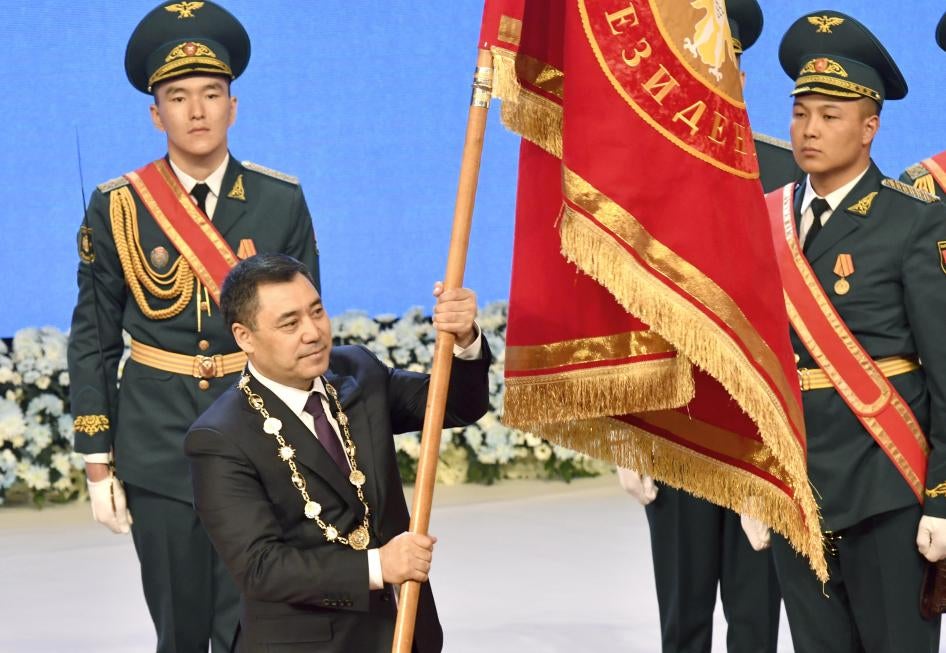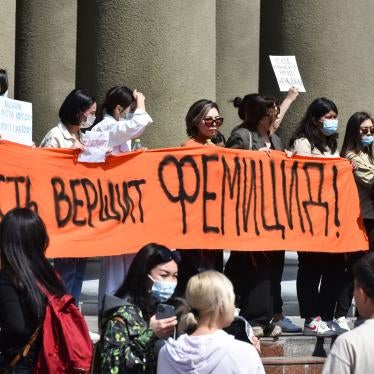(Bishkek) – Kyrgyz authorities are considering amendments to the Criminal and Criminal Procedural Codes that would put the political opposition and human rights groups at heightened risk, Human Rights Watch said today. On April 21, 2021, Kyrgyzstan’s caretaker parliament, the Jogorku Kenesh, passed a draft law with these changes in its first of three readings.
The government has proposed to broaden the scope for criminal prosecution of organizations deemed “extremist” to include those found to incite “political enmity,” along with national, ethnic, or racial enmity, and to make financing such “extremist” organizations a criminal offense. These changes would undermine the universally protected rights to freedom of association and expression in Kyrgyzstan. Such concerns are compounded by Kyrgyzstan’s lack of an independent judiciary system.
“Adding vague language about ‘extremism’ and ‘political enmity’ to Kyrgyz law will open the door to abuse, putting peaceful groups critical of government policy at enormous risk,” said Syinat Sultanalieva, Central Asia researcher at Human Rights Watch. “Kyrgyz authorities should not introduce overbroad criminal law provisions that endanger freedom of association and speech.”
The draft law still needs to pass two more readings and be signed by the president before it enters into force. The Interior Ministry, which initiated the draft law, said in proposing it that the purpose of the bill is to align Kyrgyzstan’s criminal codes with 2017 Astana Convention on Countering Extremism of the Shanghai Cooperation Organisation, in which Kyrgyzstan is a member, as well as with Kyrgyzstan’s Law on Countering Extremist Activities. Human Rights Watch and other human rights groups have expressed concerns about the Shanghai Cooperation Organisation practices and policies, as well as its 2001 Shanghai Convention and the 2009 SCO Counter-Terrorism Convention.
Legal experts in Kyrgyzstan have pointed to the potential for abuse of these amendments by the authorities, especially at the present time, when there is increased political tension in the country following a highly contested constitutional referendum and local elections.
Human Rights Watch has found that, despite some reforms, existing Kyrgyz laws on countering extremism have been applied unevenly and that its overly broad definition of “extremism” allowed their misuse against political opponents, journalists, and religious and ethnic minorities.
The Kyrgyz Criminal Code already contains articles that provide severe penalties for political crimes, such as attempting to violently overthrow the government.
This initiative to broaden criminal provisions relating to “extremism” and “inciting enmity” reflects similarly repressive government attempts to limit fundamental liberties in the country. These include a 2015 draft law on “foreign agents,” which was ultimately withdrawn, and a draft law on “manipulation of information,” which has stalled in parliament after then-President Sooronbay Jeenbekov vetoed the bill in August 2020.
“Following months of political tensions, the Kyrgyzstan government should show its citizens and the world that it still supports strong human rights standards,” Sultanalieva said. “These amendments to the legal codes should be rejected if Kyrgyzstan hopes to stay true to its international human rights commitments.”
|
News Release
Kyrgyzstan: Proposed Legal Changes Threaten Political Dissent
Reject Dangerous Amendments; Guarantee Freedom of Expression, Association
Your tax deductible gift can help stop human rights violations and save lives around the world.
Region / Country
Topic
Most Viewed
-
June 3, 2025
“They’re Ruining People’s Lives”

-
January 25, 2024
“We’re Dying Here”

-
November 25, 2019
A Dirty Investment

-
April 27, 2021
A Threshold Crossed

-
November 19, 2012
Losing Humanity





